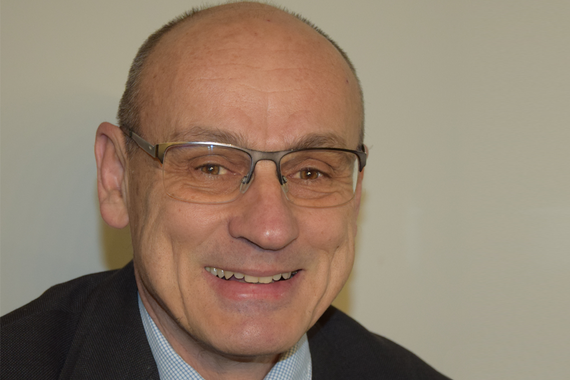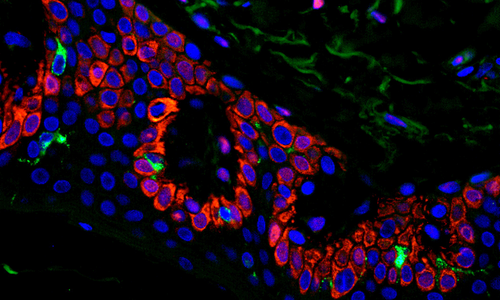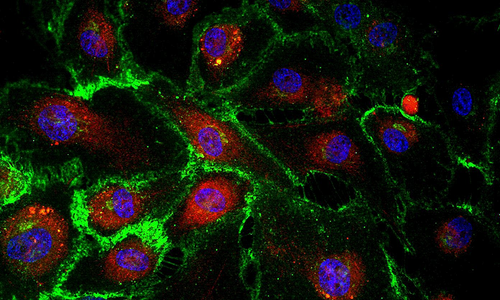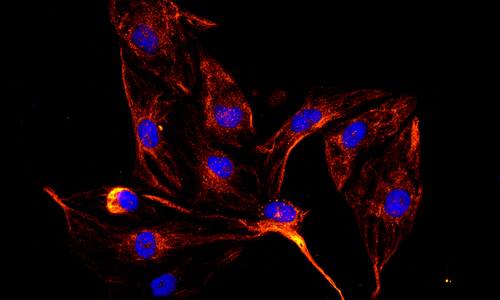-
The University
- Welcome
- Who we are
- Media & PR
- Studying
-
Research
- Profile
- Infrastructure
- Cooperations
- Services
-
Career
- Med Uni Graz as an Employer
- Educational Opportunities
- Work Environment
- Job openings
-
Diagnostics
- Patients
- Referring physicians
-
Health Topics
- Health Infrastructure
Research team Strobl
Research focus: Inflammation, autoimmunity and cancer
PI: Herbert Strobl
Focus: The system of mononuclear phagocytes and dendritic cells (DC) plays an important role in the recognition and defense against microbes and enables the induction of antigen-specific T cell immune responses. Precursors of these cells migrate into normal and diseased tissues, and the microenvironment in these tissues plays an important role in the differentiation and function of these cells. Using human models, immunohistochemistry of patients, and murine models, we aim to understand how individual signaling pathways in DCs control immunity, immune tolerance, and immune evasion. We are also investigating the mechanisms of differentiation of these cells.
Networking: In addition to collaborations within the Division of Immunology on DC: T cell interactions with Stefano Angiari and Johannes Fessler and on nutritional factors with Sandra Holasek, we collaborate closely with Armin Zebisch on miRNAs in myelopoiesis and DC differentiation and with Peter Wolf on DCs in psoriasis. Further cooperation on DC function exists with Maria Sibilia and Georg Stary (Medical University of Vienna) and Stefan Schild (University of Graz). We also collaborate with Jose da Silva (USA) on the role of miRNA 424/503 in DC differentiation.
Projects
Regulation of the differentiation of macrophages and DCs by exogenous factors
- Normal and pathologically altered tissues form microenvironments (MUs) that control the differentiation and function of DCs and macrophages. To analyze MU factors, we use 3D models of tumors with the help of the CAM (chorio-allantoic membrane) model and establish mucosal models. Defined blood precursor cells of DCs and macrophages are integrated into these models and examined. For complementary or further analyses, we use in vitro differentiation models and murine models.
- Duration: ongoing
- Funded by: FWF PhD Program MCD, FWF PhD Program IAI
Role of miRNAs in controlling DC differentiation and function
- Subsets of DCs promote or prevent inflammation. In a previous project, we found that certain miRNA molecules are produced to varying degrees by functionally relevant DC subsets. Our work showed that individual miRNAs control pathogen recognition, activation, and/or differentiation of specific DC subsets. We are investigating the underlying mechanisms.
- Duration: ongoing
- Funded by: FWF PhD program MOLIN
Influence of factors from the gut microbiome on DCs
- The intestinal mucosa is colonized by a large number of benign bacteria that are essential for the development and function of our immune system. The underlying molecular mechanisms are not yet well understood. We are testing membrane vesicles (MV) from various intestinal bacteria for their stimulatory or inhibitory effect on DCs and DC-mediated T cell differentiation. The aim is to identify new immunomodulatory bacterial effector molecules and mechanisms.
- Duration: 2018-2021
- Funded by: BioTechMed-Graz
- Project partners: Consortium Flagship Project “Sekretom”
Division of Immunology
Team
Members
- Egger Simone
- Ghaffari-Tabrizi-Wizsy Nassim
- Lang Magdalena
- Michelitsch Birgit
- Passegger Christina
- Pollack Christian
- Schimpel Christa
- Schwach Gert
- Schwarzenberger Elke
- Sconocchia Tommaso
- Tam-Amersdorfer Carmen
- Zyulina Victoria






